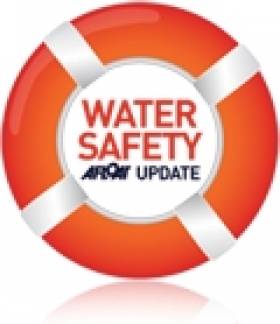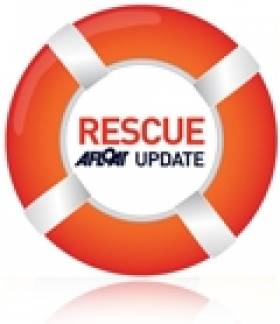Displaying items by tag: IWS
Irish Water Safety Launches TV Campaign
Irish Water Safety (IWS) has launched a new TV awareness campaign to highlight best practice whether in, on or around water in an effort to cut the number of tragic drownings on our coasts and waterways.
"Ireland is blessed with some of the most beautiful locations in the world for water based activities and this campaign will help people enjoy these waterways safely," said Minister of State Fergus O'Dowd, speaking ahead of the launch.
The number of people taking to water based activities has exploded in the last decade, says IWS, yet many have had no formal swimming or lifesaving instruction, and many do not know what to do if they or a loved one gets into difficulty in the water.
The campaign highlights the importance of aquiring these skills and others, such as how to correctly wear a lifejacket.
"The most common dangers can be avoided by logging onto Irish Water Safety's website so that when the improving weather prompts a day trip to the seaside, rivers and lakes that you are well informed and stay safe," added Minister O'Dowd.
Dun Laoghaire Rathdown Seeks Summer Lifeguards
Dun Laoghaire Rathdown County Council is now recruiting beach lifeguards for the summer season.
Applicants must be 17 years old on 1 April 2011, and hold a valid Beach Lifesaving Award/Qualification from the Irish Water Safety authority, Royal Lifesaving Society or equivalent which is no more than two years old. They must also have a knowledge of cardio pulmonary resuscitation.
Desired attributes include an understanding of local effects on beaches, such as rip currents and undertow, and a knowledge of water sports enjoyed by the public.
Interviews will be followed by a swimming test, and successful candidates will be subject to Garda vetting.
Application forms are available from the DLR County Council Office, Dundrum Office Park, Main Street, Dundrum, Dublin 14 or from the information desk at County Hall, Marine Road, Dun Laoghaire, Co Dublin.
The closing date for applications is 4.30pm on Thursday 31 March 2011.
For more details can be found on the Dun Laoghaire Rathdown County Council website.
1,499 Lives Lost in Ten Year Tragic Tide of Drownings
Irish Water Safety is calling for people to be more aware of the dangers presented by water based activities and wants the general public to know that there are many reasons people drown which are not simply limited to warmer weather risk taking. People have a responsibility to themselves and family to stay safe around water by knowing the dangers and learning from the lessons offered by the 1,499 person's lives tragically lost in a ten year period.
A synopsis of some general contributory factors over the years
1. Poor or inadequate equipment (e.g. boats or lifejackets);
2. Alcohol consumption;
3. Falling unexpectedly into water ;
4. Improper use of boats and equipment;
5. Overestimation of skills;
6. Lack of local knowledge when travelling in Ireland and abroad;
7. Not being able to swim;
8. Easy unauthorised access to waterways;
9. Cold;
10. Current (including rip currents, river currents, and tidal currents);
11. Offshore winds (including flotation devices);
12. Pre-existing diseases (e.g. heart attacks);
13. Underwater entanglement;
14. Bottom surface gradient and stability;
15. Waves (coastal, boat);
16. Water transparency;
17. Impeded visibility (including coastal configuration, structures and overcrowding);
18. Lack of parental supervision (infants and children);
19. Change in weather conditions;
20. Excessive 'horseplay' or over exuberant behavior (including "tombstoning" from cliffs);
21. Swimming outside the depth of the user.
22. Suicide and Homicide
A synopsis of some general preventive and management actions
1. Public education by Irish Water Safety regarding hazards and safe behaviours;
2. Teaching children to stay away from water when unsupervised through the IWS PAWS (Primary Aquatics Water Safety) programme;
3. Continual adult supervision of children;
4. IWS media campaigns that drowning can happen quickly and quietly;
5. Promote in IWS press announcements, the restriction of alcohol provision before or during aquatic activities;
6. Provision by Irish Water Safety of properly trained and equipped lifeguards;
7. Provision of rescue services;
8. Irish Water Safety Risk Assessments that include assessments of local hazard warning notices, access to emergency response and availability of resuscitation skills/facilities and other factors;
9. Development by Irish Water Safety of rescue and resuscitation skills among general public and user groups;
10. Coordination by Irish Water Safety with user group associations concerning hazard awareness and safe behaviours;
11. Wearing of adequate lifejackets and Personal Flotation Devices when boating;
12. Fencing and doors to isolate outdoor pools, slurry pits, rivers on farms and other water features near populations.
The 20% decrease in the number of incidents involving leisure and recreational activities to which the Irish Coast Guard had to respond can be accounted for in no small part by the increase in the general public's awareness of water safety best practices. The change in culture on our aquatic environment is comparable to that which saw a huge increase in the wearing of seatbelts in cars over the last two decades. The huge increase in the number of people taking to water-based activities in the last decade saw the culture shift progressively towards a responsibility among the public to wearing lifejackets when taking to water based activities.
Irish Water Safety is the statutory body established to promote water safety in Ireland. Their role is to educate people in water safety best practices. They develop public awareness campaigns to promote necessary attitudes, rescue skills and behaviour to prevent drownings and water related accidents. Activities include:
Teaching swimming and lifesaving courses to children and adults. Recipients build skills in swimming, water confidence, safety, survival, rescue skills and resuscitation. Participants can progress to qualify as Pool and Beach Lifeguards, there are 27 qualifications that are internationally recognized and are available to children and adults nationwide.
Lectures and demonstrations to members of the Public and other interested parties.
Publishing literature to promote water safety and target at-risk groups. Popular posters include safe boating, safe swimming, and lifejacket posters. A Cold shock/hypothermia leaflet is also available as are many other publications.
Volunteers carry out Risk Assessments on all Bathing Areas nationwide, free of charge in order to make them safer by the erection of ring buoys, signage and other necessary action. The Local Authorities are most helpful in this regard.
Advise and assist Local Authorities on all matters relating to water safety.
The Nation’s Beach Lifeguards are tested by IWS examiners for the local authorities, free of charge prior to the annual summer season.
A programme exists in which National School teachers are coached in teaching water safety principles to their pupils.
Training all the boats crews for the Inshore Rescue Boat Service nationwide. The IWS also train and examine the Coast Guard Inshore Rescue Boats crews.
Promoting water safety along with other members of the Marine Safety Working Group and the Irish Marine Search and Rescue Committee.
National and local media actively communicates IWS safety messages to the public.
Issuing advice on all aspects of water safety. Press Releases are available all year round, which target the seasonal hazards on Irish waterways.
Organising the Annual National Lifesaving Championships; some members thn go on to compete in international events each year.
Awarding the ‘Just in Time’ Rescue Award to rescuers nationwide; other awards recognise work promoting Water Safety in Ireland.
The IWS develop a partnership approach with private sponsors to deliver safety messages to the public.
Providers of information on the locations of Lifeguarded beaches in Ireland.
History of Irish Water Safety
Before 1945, life-guarding was confined to a few counties in Ireland – that is, in Wexford, Waterford, Cork, Dublin and Clare. Indeed, the teaching of swimming and water safety as we know it was done on an ad hoc basis around the country, but mostly in the cities of Dublin and Cork where indoor swimming pools were available. It was only when a member of An Garda Síochána, Mr Harry Gillespie (who was Chairman of a small Water Safety Committee in County Clare) decided to approach the Irish Red Cross Society in May 1945 that Water Safety was established in Ireland on a formal basis.
Under the auspices of the Irish Red Cross Society, local Area Water Safety Committees were established in all of the counties of Ireland. Naturally, there was very little expertise in this country in the matter of water safety and swimming rescue, so it was decided that the American Red Cross should be approached as they had an excellent Water Safety Service running in the USA for many years. From them came the necessary approach to teaching water safety, then generally known as swimming rescue. Their booklets were also used as the basis for the first water safety manuals published by the Irish Red Cross Society (Water Safety Service).
It is worthy of note that several present members are recipients of the ‘Service Medal of Honour’ being founding members of the Water Safety Organisation in Ireland. For twenty-six years, Water Safety operated under the auspices of the Irish Red Cross Society and it was during this period that the structure of Examiners, Instructors and other voluntary (non-technical) personnel was established. During those early days, there were few indoor swimming pools in this country for the teaching of swimming and lifesaving. Much of the work was done during the Summer months at piers, quays, beaches, on riverbanks, and at lake sides. It was also during those first twenty-six years that we saw the increase in the use of lifeguards around the coast of Ireland during the summer. It must be remembered that few people could swim and fewer still could swim and save a life. Indeed, in many of the coastal towns and villages, particularly where their livelihood was derived from the sea, there was an old superstition, that it was better not to learn how to swim as it only prolonged the agony in the water when in difficulty.
Change was slow due to a lack of resources, but voluntary commitment was strong among the members, as it is to day. With time, improvements followed and a more conscious awareness of water safety began to unfold throughout the country, particularly as the seventies approached and the work of the Water Safety Service expand to every county throughout the country. The leading light at that time was a man called Plunkett Walsh, an employee of the Irish Red Cross Society with special responsibility for Water Safety. His great enthusiasm was an inspiration to all involved in the Water Safety Service to promote water safety awareness. However, his untimely and sudden death left a great void within the organisation.
Following this, in 1971 an approach was made to the Minister of Local Government who agreed to the establishment of the Irish Water Safety Association under the auspices of the Department of Local Government. This move was universally welcomed, albeit tinged with certain sadness on leaving the Irish Red Cross, with whom water safety had been for twenty-five years. The first Chairman of the Irish Water Safety Association was Mr Desmond Kenny who was from Galway.
With the establishment of the Irish Water Safety Association came an upsurge in membership, to meet the growing demand for swimming and lifesaving instruction throughout the country. In turn, this demand led to the construction of many indoor swimming pools and improved bathing facilities in many parts of Ireland. Shortly after the establishment of the Irish Water Safety Association, it was invited to join both Federation International De Sauvetage and World Life Saving, both international bodies dealing with water safety and rescue.
In 1987, a Government decision was made resulting in the IWSA being amalgamated with fire and road safety under the auspices of the National Safety Council. The members continued to give exceptional time and effort on a voluntary basis to ensure that swimming and lifesaving was taught nationwide and Water Safety went from strength to strength and the number of voluntary members involved continued to grow. Certificates issued for swimming and lifesaving increased annually, and the ‘Water Safety Awareness’ campaign was promulgated nationwide. With the encouragement of the National Safety Council, water safety personnel played an active role in the formation of the new International Life Saving Federation, which was established in 1994.
1995 was the 50th anniversary of the formation of Water Safety under the auspices of the Irish Red Cross, the Irish Water Safety Association and the National Safety Council. To mark this occasion, a suitable medal was struck to honour those who had given long and valued service throughout those fifty years. In November 1996 at a meeting of the Board of the National Safety Council, it was agreed that Water Safety be known as Water Safety Ireland. In the National Budget of 1998, it was announced that the Government had set a side the necessary finance to re-establish Water Safety as a singular organisation. The effect of this decision being that Water Safety was to leave the National Safety Council. The decision to establish Water Safety as the Irish Water Safety Association with its Headquarters in Galway took effect in November 1999. A Council of 12 persons was appointed with Mr Frank Nolan (a retired member of An Garda Siochana) being appointed as Chairman. The functions of the new body are similar to those that have been traditionally carried out over the past fifty-five years.
The new Association, which is the Statutory Water Safety Body for Ireland, is financed by Government, Local Authorities, fund-raising and sponsorship. The Association continues to be actively involved with International Life Saving (the world body) and co-operates with the other national organisations involved in water safety and rescue.
On the 25th August 2000, in front of a large audience, Minister of State, Mr Robert Molloy, TD, opened the new Headquarters of Irish Water Safety close to the Spanish Arch in Galway City. Irish Water Safety is governed by the Council, which is appointed by the Government for three years, supported by a full-time permanent staff. The functions of the Association are supported nationwide on a voluntary basis through 28 area Water Safety Committees and two special Committees (one within the Irish Police Force and the other within the Defence Forces). Persons who give exceptional Service over 25 to 50 years receive the ‘Medal of Honour with Bar’. Persons outside the Association, who have been supportive of Irish Water Safety over a number of years, can be honoured with a Life Governorship of the Association. Ten persons so far have been conferred with this honour.
The Irish Water Safety Motto: 'Every Person a Swimmer and Every Swimmer a Lifesaver'
Irish Water Safety (IWS), The Long Walk, Galway. Tel: 1890 420202, Fax: 091 564700, Email: [email protected]
Other IWS Afloat posts here:
































































